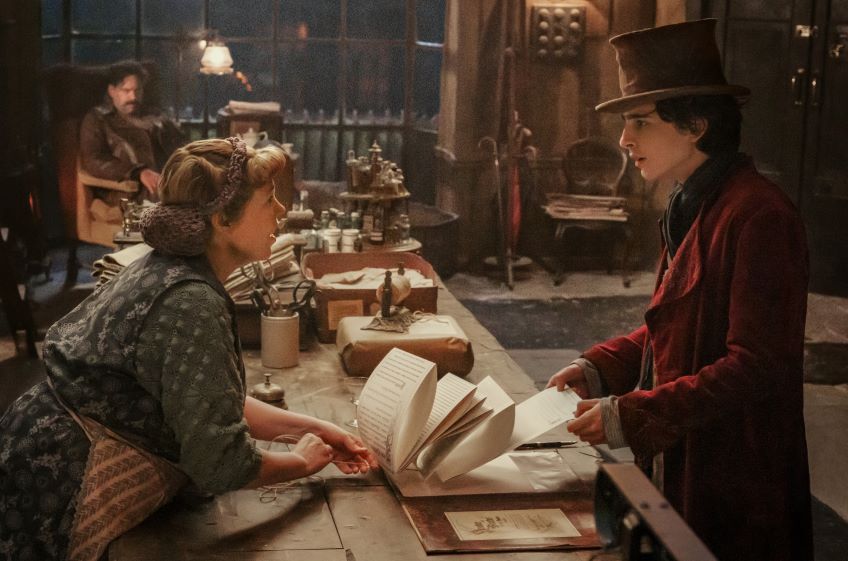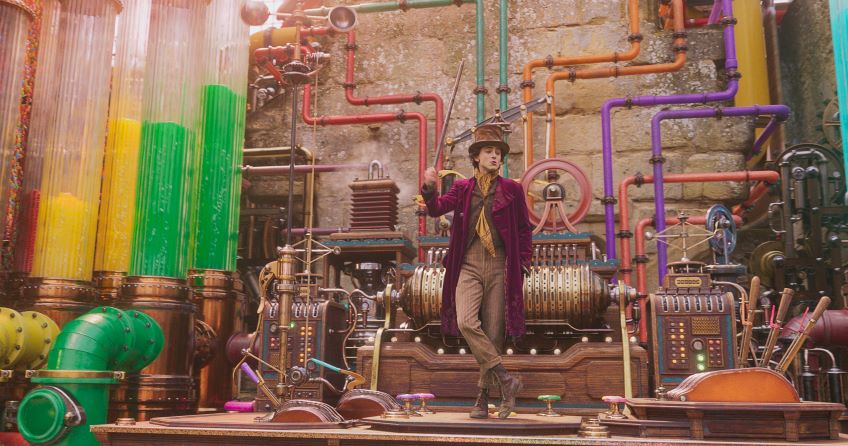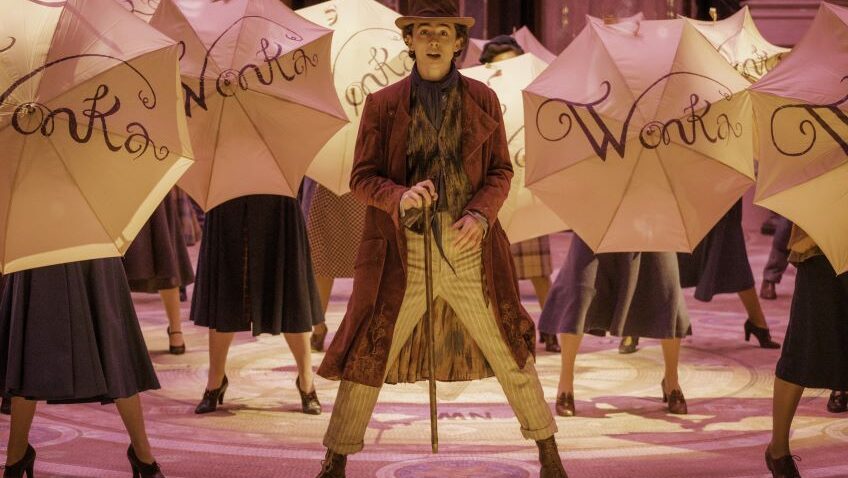Joyce Glasser reviews Wonka (December 8, 2023) Cert PG, 116 mins.
If anyone other than Paul King were behind this prequel to the 1971 and 2005 adaptations of Roald Dahl story Willy Wonka and the Chocolate Factory would it have the accolades that some critics have bestowed? King is behind the much beloved Paddington movies, which have earned him a lot of good will, even before the late Queen promoted the character. There are even similarities between the bear, a cute, lonely immigrant arriving in a foreign city with a sweet tooth, a good heart and a naïve trust in all people and the Willy of Wonka. The Paddington films were delightful, funny, cosy and fresh, and so well written that even the schmaltz was charming. But Wonka? Really?
It’s not just that Wonka is a musical, with generally forgettable songs and a score by Neil Hannon and Joby Talbot, respectively. Or that the choreographer is a mystery, leaving one to believe the group numbers are derived from a 1980s upper East Side aerobics routine. Nor is it that King has ignored the contribution of chocolate to our nation’s alarming obesity, hardly an issue when Dahl wrote the novel in 1964 and Twiggy was trend setting. It’s that Wonka is a feeble prequel, one that neglects the evolution of Willy Wonka from saintly, naive lad here to the character in the story.
Paul King (who wrote the script with Simon Farnaby) is certainly a writer, but one who might have had a run of writer’s block while conceiving Wonka. The evidence is the thin plot, the lack of Roald Dahl’s signature darkness, the flat humour and characters straight out of Oliver Twist and Sweeny Todd.

Olivia Colman is, as usual, excellent as the duplicitous launderette proprietor Mrs. Scrubitt, but her looks and demeanour, chucking her human slaves down a hole into the basement, is so reminiscent of Mrs Lovett in Sweeny Todd, that you can’t get her out of your head. Scrubitt’s boyfriend Bleacher (Tom Davis) is not tragic as Sweeny Todd; he’s closer to a Dickensian Bill Sikes.
Mr Bleacher’s role is to precure singletons down on their luck and looking for lodging. When Scrubitt presents Wonka with a long contract he cannot read, a young orphan girl, Noodle (Calah Lane) tries to warn him not to sign it, in vain. He ignores her and she is punished for her compassion, though not as harshly, as Nancy in Oliver Twist.
The rest of the laundry slaves, resigned to paying back their debt to Scrubitt for years, include Abacus Crunch (Jim Carter) with a name that hints at his former profession. They are undeveloped characters. When Wonka hires them to help him run his chocolate factory, they appear to have convenient skills, but Noodle (as her name suggests) is the brains. It’s a good thing, too, because Wonka has, er, other qualities, such as making a large jar of chocolate balls from a portable cabinet of food stuffs and fairy dust. He manages to make the chocolate without milk, but, in the most self-indulgent scene in the film, when he suddenly needs milk he and Noodle sneak into a zoo to milk a friendly giraffe.
Wonka has a bigger problem than even Scrubitt and the city’s crooked police chief (Keegan-Michael Key). The police chief is addicted to chocolate and is bribed by the chocolate cartel (headed by Joseph Patterson’s Arthur Slugworth) to prevent competition. Although Wonka’s chocolate is superior, he cannot, without his factory, produce enough to satisfy the voluminous chief. Only the gluttonous villain is obese, while Wonka, lean and with healthy white teeth could be bottling water.
When Wonka miraculously (it seems to happen overnight) opens his opulent chocolate show room, his challenges continue to mount. The deliriously happy population suddenly turn against Wonka, due to a malevolent act of revenge.
Nathan Crowley’s production design, usually pretty good, fails to evoke a period in time or a location Judging from the mix of accents (Chalamet, Lane, Key and Richard Fulcher speak in American) the population’s addiction to chocolate and a few corrupt police, it might be London. Granted, this is fantasy, but fantasy has to create a world where you believe these people live.
Timothee Chalamet will draw in the crowds, but it’s not good casting. Even by the reduced star-drive standards of film musicals, he is neither a singer nor a dancer.

Chalamet’s greatest role to date and his greatest film so far is Call Me By Your Name, the film that launched his stellar career. He is a leading man, but the roles where he plays a slightly androgynous, vulnerable, troubled heart-throb yet a leader Dune, Bones and All or Ladybird are his best. A Rainy Day in New York, bombed in part because he lost his charisma with a fumbling character and poor comic delivery.
Whatever Chalamet plays, whether future saviour, tragic cannibal, middle-class drug addict (Beautiful Boy) or Prince Hal trying to forge his own path as king (The King), Chalamet hasn’t and shouldn’t play a childlike dimwit. In keeping perhaps with the chocolate recipes inherited from his prematurely deceased mother (Sally Hawkins), as shown in a mawkish introduction, and his ability to feed the public ambrosia and fantasy, there is something childlike and asexual about Wonka, which hardly plays to Chalamet’s strong suit.
The film is studded with stars but the only laugh Rowan Atkinson gets as Father Julius is the hopeful laugh of recognition. The derivative jibes at the glutinous priest suffer diminishing returns. We should get an indication (since this is a prequel) that Slugworth is playing a role, but we don’t, and it’s that hopeless naivety that explains why Wonka chose a city with an entrenched chocolate cartel to launch his new chocolate business.
With high hopes, Hugh Grant – so hilarious in the Paddington films – appears as Lofty, an Oompa-Loompa, paving the way for Wonka’s future helpers. Lofty is a chocolate thief – revenge for Wonka’s colonialist theft of cocoa beans – turned Wonka ally after reparations. But Lofty is a dwarf. Such casting choices are not all objectionable, but Grant’s CGI transition looks weird. And Grant is not so funny here that no other actor would do. His link is to Bond’s Paddington, not to Dahl. You really do miss a dwarf in the role, and not just because there are stars of all sizes waiting for a break.




